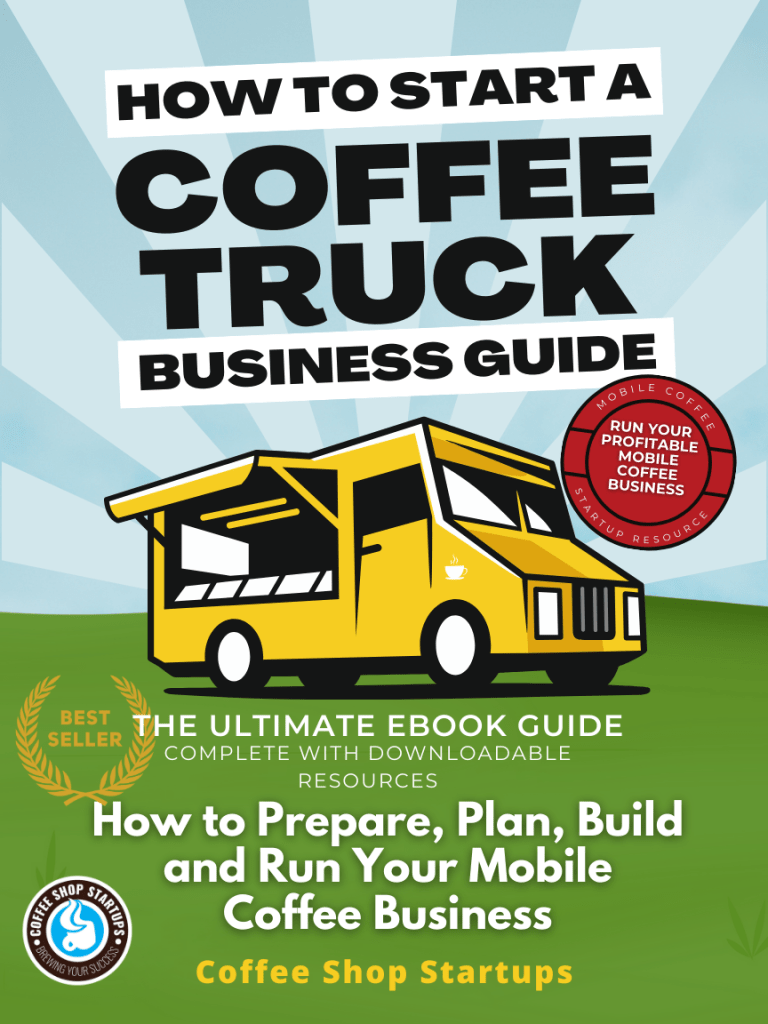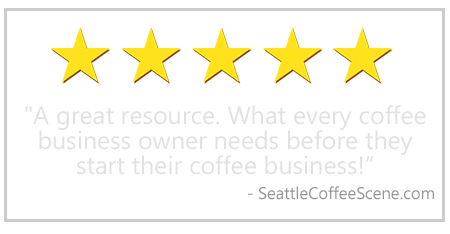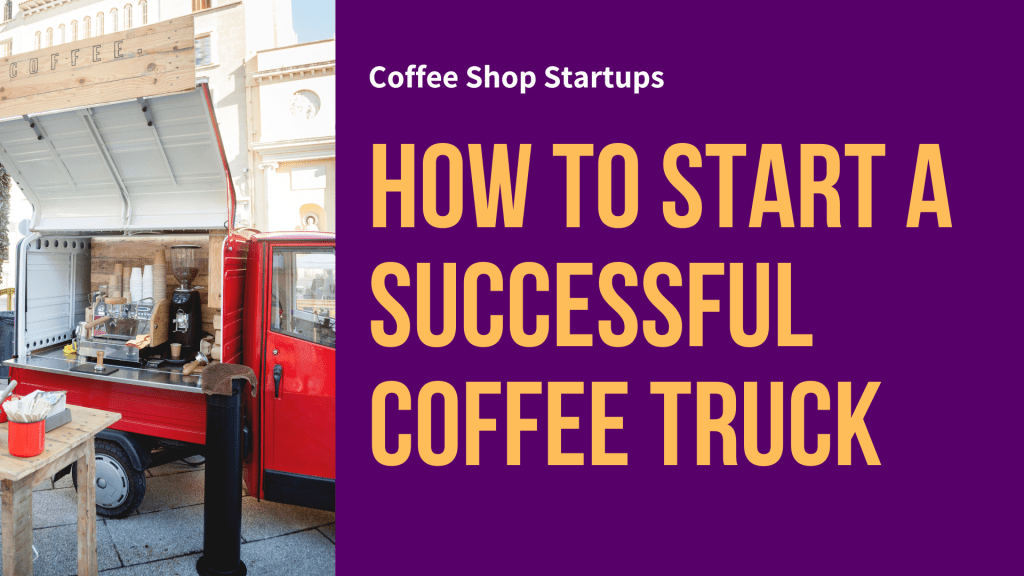
Coffee Truck Success Blueprint
How to Start a Coffee Truck Business
Why Start a Coffee Truck?
If you’ve ever dreamed of running your own coffee business but don’t want the high costs of a traditional shop, a coffee truck is an excellent alternative.
Mobile coffee businesses have lower startup expenses, offer more flexibility, and allow you to take your coffee directly to customers—whether at office parks, festivals, or farmers markets.
Of course, coffee trucks allow you to test different locations and customer demographics without being tied to a lease. So, that’s what you’ll have to do – a little trial and error – to find the best spots during the best times of the week.
Okay, let’s discuss a few essential steps, costs, and strategies for launching a profitable coffee truck.
![]()
Steps to Start a Coffee Truck Business
Okay, so let's get down to it – Below are the key steps to start your coffee truck business. Consider each of them – and how they pertain to your specific situation – as you set out to plan and launch your mobile coffee business.
1. Choose a Coffee Truck Concept
There are a variety of mobile coffee concepts to choose from. Take time to discover what your options are. Start by visiting a few existing coffee or food trucks in your area. Even if you already have an idea, a real-world visit can help you determine what direction you would like to move towards.
Visit with them and figure out what you like and don't like. If you don't have any available coffee trucks or coffee trailers available to visit in your area, check out a few online.
Your concept is essentially the practical representation of your vision. In essence, it is recommended that you properly develop your mobile coffee vision before moving forward.
While your coffee truck concept will be your ideal goal for your coffee business, it may evolve due to your practical necessities, budget issues, or competition. So, understand that you must be flexible as you move forward.
2. Determine Your Target Customers
When starting any coffee business, you want to stay focused on your customers right from the beginning and throughout your entire process. For mobile coffee businesses, staying laser-focused on your target customers will steer you in the right direction.
Who do you imagine serving your coffee to? Will you work at private events, ticketed festivals, community farmers markets, or other special dates like weddings and anniversary parties? Will you be serving tourists or locals? Or any combination of these?
The customers you plan to serve will significantly impact your menu. Likewise, your coffee menu will impact your need for coffee equipment. Your coffee equipment will determine your need for physical space, and so on.
Your coffee business costs are never really independent of one another. They are all connected. Knowing your ideal customer will help you make critical decisions as you move forward.
3. Develop a Coffee Truck Concept
Now that you understand your coffee truck concept and know your target customers, it’s time to get serious about your startup budget. No doubt, your available cash (or access to money) will shape your coffee truck’s concept or force you to make key adjustments to better align with your financial reality.
Many aspiring coffee truck owners start with big ideas, only to hit a hard financial wall when they realize how much it actually costs to get up and running. To avoid surprises, take a detailed and strategic approach to budgeting from the start.
Set Up Your Coffee Truck Budget Right from the Start
Start by listing every essential expense, including:
- Truck Purchase and buildout: Buying new vs. used, modifications, and installation. This may include transportation, storage, and labor.
- Coffee Equipment & Utilities: Espresso machine, commercial coffee grinders, water filtration systems, and a power generator. This may include installation expenses.
- Coffee Truck Licenses & Permits: Local health codes, inspections, and mobile vending licenses are key to your startups. These expenses are not insignificant and should be planned for.
- Initial Inventory & Supplies: Whole coffee beans, milk, syrups, cups, napkins, and a dozen other small supplies.
- Marketing & Branding: Logo design, website, social media ads, signage. Together, these can significantly increase startup costs.
Once you’ve outlined these costs, categorize them and set a timeline for each purchase. This will help you plan cash flow and prioritize the most critical expenses first.
Add a Buffer: Add 15% to Your Coffee Truck Budget Estimate.
Unexpected costs are inevitable. Whether replacing an axle, upgrading electrical wiring, or installing electric brakes (all things I personally had to do), there will always be expenses you didn’t anticipate. Adding at least a 15% cushion to your coffee truck budget will definitely help soften the blow of any likely surprises and keep your start date on track.
Avoid Common Budget Mistakes (I made some of these!)
- Underestimating coffee equipment and buildout costs
- Not giving permits, insurance, and ongoing enough budget
- Overspending on branding (logo, exterior paint) before securing key essentials
- Not factoring in emergency repairs (so important!)
By planning ahead and budgeting smart, you’ll set your coffee truck up for long-term success—without financial surprises throwing you off course.
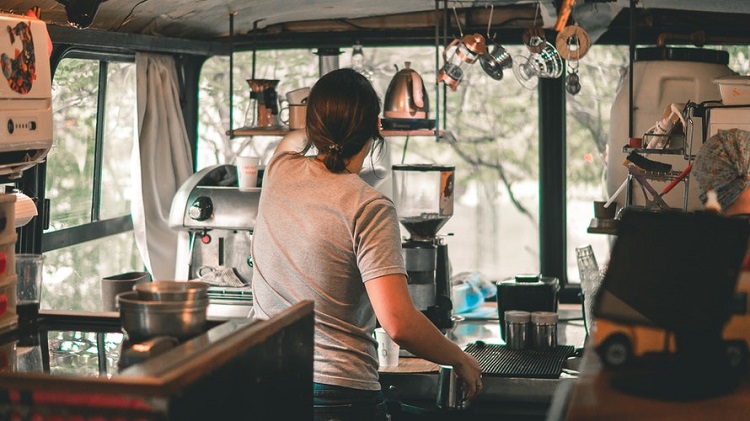
4. Secure Your Coffee Truck Funding
Your coffee truck will require startup money. Ultimately, how much money your coffee truck will cost will depend on the concept and unit you have decided to run with.
Consider precisely how much money you will have access to acquire your coffee truck and build it out – I call this a coffee truck funding mix. This funding mix may come from your savings, loans from friends and family, partners, or other sources.
If you have some money set aside for your coffee truck business but may need to borrow the rest (investors or loans), you will want to know approximately how much you'll need.
Before approaching anyone for a loan, it's best to work out your budget beforehand so that you understand exactly how much you need – and to what specific purpose the money will go.
How Much Money Do I Need to Start a Coffee Truck?
Starting a fully operational coffee truck business will cost between $20,000 and $75,000. The middle range may be around $30,000 to $40,000. However, some essential factors determine what you need to budget for.
Obtaining a new or used coffee truck will be one of the two most considerable startup costs. This may vary depending on your location and the availability of the type of coffee truck you want.
The next big category of coffee truck costs will be your equipment and its proper installation. Other significant costs will include your marketing, such as a coffee truck website, a paint job or wrap, and other logo design work. Finally, you’ll need insurance, a commissary agreement, and initial inventory to get everything up and running. (We'll cover your coffee truck's cost later in this post.)
5. Get Your Mobile Coffee Truck
The exciting part is getting your mobile coffee truck! Now that you have written your plan, developed your budget, and considered your funding sources, it's time to get your coffee truck.
Hopefully, during budgeting, planning, and learning about retail coffee, you've focused on available coffee trucks or trailers.
I do want to add that you have two major options to get your coffee truck. You can refurbish or retrofit an existing truck or buy a new coffee truck or trailer.
You might look at available options on sites such as Craigslist, Facebook, or Offer Up, where you can buy a used truck (You'll want to beware of scams!). There are also food truck manufacturers that can produce a coffee truck to your specifications.
When deciding about your coffee truck, consider your budget, the equipment you will need, and the layout that works best for your workflow. Remember to account for costs like installation, insurance, permits, and any additional modifications required to meet health and safety regulations in your area.
New vs. Used Coffee Trucks
One of the biggest decisions you’ll make when starting your coffee truck business is whether to buy a brand-new or used coffee truck. These two common routes obviously have pros and cons. I struggled with this very decision as well. The right choice depends on your mobile coffee budget, timeline, and ultimate business goals.
A new truck offers the advantages of workflow customization, cleanliness, and reliability, but it’s likely to be more expensive. On the other hand, a used coffee truck can be more affordable and quicker to set up—especially if it's been serving coffee in your area—but it may require upgrades and repairs.
Getting a New Truck: Advantages and Disadvantages
No doubt, a brand-new coffee truck is ideal if you want a quick, ready-to-go solution with new coffee equipment and custom features. Many coffee entrepreneurs choose this route because they can design the layout, ensure all appliances are up to code, and avoid the risk of hidden issues.
PROS of Buying New:
- Fully customized to your needs (layout, equipment, branding)
- Less risk of mechanical or plumbing issues
- Meets health and safety regulations from the start
- Manufacturer warranties on equipment and truck parts
CONS of Buying New:
- Higher upfront cost (ranging from $25,000 to $100,000+)
- Longer build time (custom orders can take months)
- Potential financing or loan requirements
Coffee truck owners who have the budget for long-term investment and want to avoid unexpected repair costs.
Buying a Used Coffee Truck: Pros and Cons
A used coffee truck can be a great way to save money and get started faster, but it comes with risks. If you find a well-maintained truck with the right equipment, you can get started right away. However, if the coffee truck needs major upgrades, a good cleaning, newer equipment – or some modifications to pass inspection – it could cost you more in the long run.
Pros of Buying Used:
- Likely lower upfront cost (often between $10,000 and $30,000)
- Faster setup and launch time (Especially if already in your area)
- May include existing equipment, saving you money (negotiate this!)
- No waiting on manufacturers for custom builds
Cons of Buying Used:
- Probably some repairs, upgrades, and maintenance costs
- Important: You may not meet local health codes without modifications!
- Limited customization options – since the workflow is likely built-in
If you are looking for a budget-friendly way to start, you are willing to invest time in upgrades and repairs – this might be a great option.
6. Choose Your Coffee Truck Equipment
Once you've determined your concept, customer, budget, and coffee truck menu, you can focus on your coffee equipment.
Your coffee equipment is the foundation of your mobile coffee business. Without it, you cannot provide your customers with coffee.
You will want to choose coffee equipment that will help you serve your menu, such as an espresso machine, coffee grinder, brewers, ice machine, and refrigerator. Select only commercial-grade equipment that adheres to your health department's regulations. Additionally, consider each item's space, power, and installation requirements to ensure that they fit into your coffee truck setup.
How To Start a Coffee Truck Business
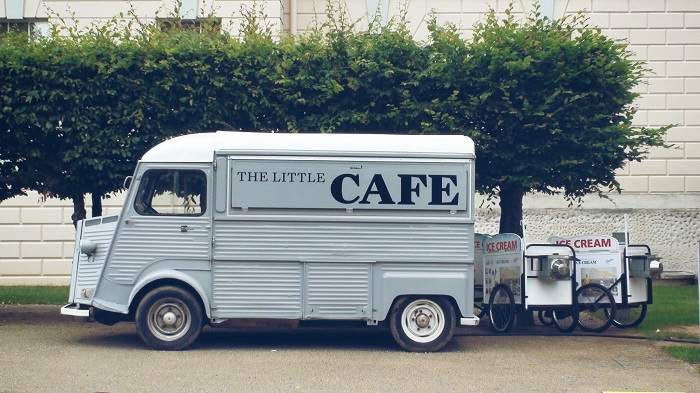
7. Powering Up Your Coffee Truck
One of the first challenges you'll face in a coffee truck or trailer is figuring out how to power it.
Every commercial coffee equipment needs electricity (or propane), so how will you supply it? Will you plug into an available power outlet or rely on a generator?
Understanding your power requirements is critical to running a smooth mobile coffee business. Each machine—espresso machines, grinders, refrigerators, and blenders—draws a specific amount of wattage.
Before you build your coffee bar or purchase equipment, you must calculate how much power you’ll need and design your electrical setup accordingly. Planning will save you from costly mistakes and ensure your coffee truck runs efficiently.
Water: The Lifeline of Your Coffee Business
Water is just as important as electricity. You’ll need it for brewing coffee, steaming milk, cleaning equipment, and keeping your hands washed throughout the day. On top of that, consider the water needed for rinsing utensils like frothing spoons and milk pitchers.
Think ahead about your daily water needs. Will you carry extra potable water, or can you connect to a water supply through an inlet valve? You’ll also need a reliable water filtration system to ensure your coffee tastes great and your equipment stays in top shape.
Determining where your wastewater—gray water—will go is just as important. Health regulations often require that gray water be disposed of at a licensed commercial commissary, so check with your local health department to stay compliant. A well-planned water system isn’t just about convenience—it’s key to passing health inspections and keeping your business running smoothly.
8. Write a Coffee Truck Business Plan
Having a well-written mobile coffee business plan will make life easier for you as you move forward with your mobile coffee business. Now that you have the information from our tips above, you should be ready to write your coffee business plan.
Writing a business plan will help you:
- Organize your thoughts
- Budget your coffee truck better
- Help you secure funding
Your investment in time and effort to write your business plan will certainly pay off. However, if you don't know where to start, start with our Coffee Shop Business Plan Guide and Template, which you can find in our Complete Coffee Shop Startups Kit.
9. Pass Health Department Inspections
Passing your coffee truck inspections is a journey. You need to know the requirements mandated by your local health department long before you decide which coffee truck to buy and certainly before you build it out.
Our strong recommendation is that before you buy your new or used coffee truck, you should also review the regulations of your local health department in the jurisdiction in which you plan to do business. Unfortunately, it's pretty common to invest a lot of money in your setup only to have it unable to pass inspection.
In my guide, How to Start a Mobile Coffee Business, I discuss how I took a different route to opening my mobile coffee business, which included completely refurbishing an old Shasta trailer.
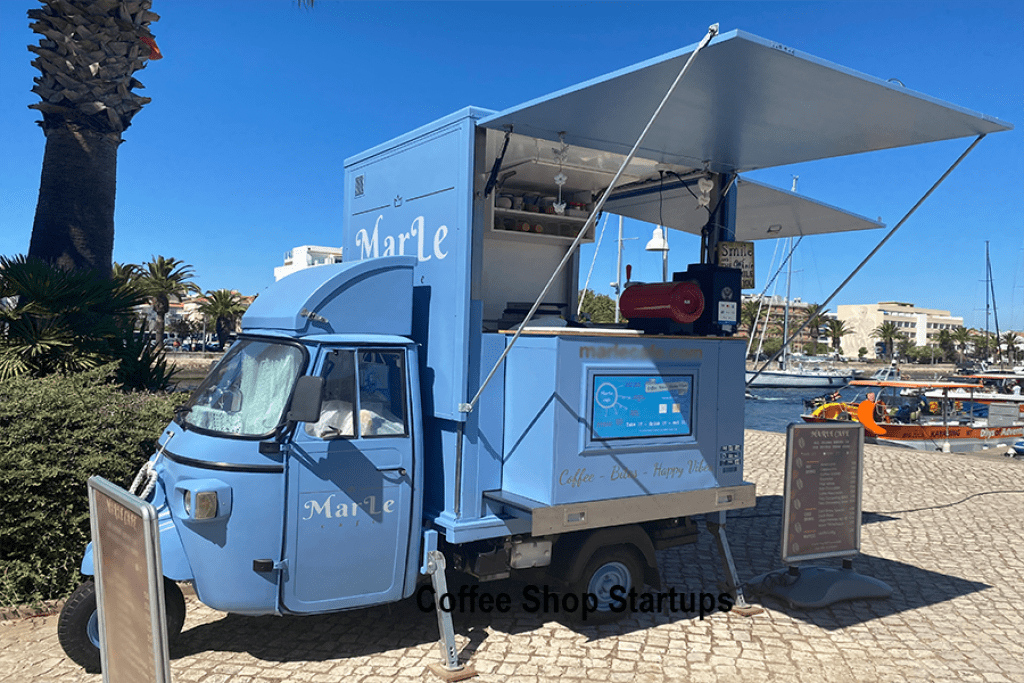
10. Get Barista Training
Serving great coffee to your customers is a must. If you have not been a barista, it might be helpful to get barista training. Most likely, you will be the primary person serving coffee. That is until you hire someone. In this case, your responsibility for training your employees will be essential to your job.
Even if you have experience as a barista, refreshing your barista skills will improve your overall coffee business. It will enhance customer experience and eliminate waste.
Why barista training matters:
- It makes you more efficient (less waste)
- Build drinks faster (serve more people in less time)
- Product quality is better
- Respond to problems more effectively
Depending on where you live, you might be able to find a local coffee educator to train with you or your employees. Fortunately, some good online barista training programs will help get your coffee skills up to speed.
11. Your Coffee Truck Marketing Plan
Coffee can be a competitive industry, and you need to stand out to succeed. A strong marketing strategy will help you attract customers, build a loyal following, and keep them coming back.
As you launch your coffee truck business, having a well-thought-out marketing plan will be essential to generating buzz and establishing your presence.
The basics of a marketing plan include developing a brand identity that sets you apart. This means crafting a memorable logo, defining your niche, and creating a compelling story behind your business. Supporting your brand with a professional coffee business website, business cards, and social media presence will help build recognition. But don’t stop there—getting involved in your local community can be just as powerful.
12. Before Opening Your Coffee Truck
You'll be almost ready to go after you’ve secured all needed coffee truck permits and licenses and run through your checklists, including commercial vehicle and commercial liability insurance.
I strongly recommend you do a practice run-through – for example, invite your family and friends over for a private event and simulate your work day. Go through the entire process of opening and running your coffee truck. This includes ensuring you have enough power (gas), milk, and water to serve your coffee drinks. Ensure that your Coffee Truck POS system is set up and the menu is exactly how you want it to be.
Building your coffee drinks, taking orders, practicing with your POS system, and refilling things that need to be refilled will be an excellent opportunity to assess what you can do better before opening your coffee truck. Ask for feedback from your friends and family – what could have been done better?
- Review your coffee truck startup checklist
- Do a practice run-through
- Practice with your Coffee Truck POS system
- Assess what could be done better
- Ask for feedback
![]()
How to Find the Right Coffee Truck Location
Setting up a coffee truck business allows you to be pretty flexible. And you would think that it would be pretty easy to find the perfect location. But in reality, finding the right location for your coffee truck can actually be challenging.
As you know, a great location can drive consistent foot traffic, while a poor choice can make it difficult to attract customers – which means there will likely be competition for the best spots in town.
Starting a coffee truck means having the freedom to serve coffee practically anywhere—and you would think that it would be super easy to find amazing spots—but it can be a challenge! Some locations may seem great on paper but don’t translate to consistent sales. Others might require extra legwork, but once you’re in, they can become coffee customer goldmines.
I thought I was pretty seasoned at finding the right location, but I learned by trial and error. The good news is that with the right approach, you can avoid some of my costly mistakes and set yourself up for success.
Here is how to find the best spots:
Research High-Traffic Areas in Your Town
- Office Districts, Apartment Complexes, and Business Parks: Employees and residents often seek convenient coffee options before work and during breaks. Establishing a presence here can mean repeat customers who rely on you daily.
- Universities & Schools: Students are your bread and butter! College students are reliable coffee consumers, but you may need special permission to operate near campus. Get that permission first! Some campuses allow coffee trucks in designated areas, while others require partnerships with student organizations or event coordinators.
- Farmers Markets & Community Events: These venues provide guaranteed foot traffic on specific days. Make sure you have whole coffee bean bags for sale too! These customers love supporting local businesses, and having retail options can increase your sales per transaction.
- Public Transit Hubs: Be ready for high traffic at transit locations. Train stations, bus stops, and commuter parking lots are excellent locations for early morning sales. Just be sure to check vending regulations, as some locations may have exclusive contracts with vendors.
City Zoning & Street Vending Restrictions
Seattle is very particular, and I imagine your city is, too. Some areas have designated food and coffee truck zones, while others require permits to park in public areas. Getting fined or shut down because you didn’t check the rules can be a painful (and expensive) lesson, so do your homework.
Specifically, research the following:
- Local ordinances to see where vending is permitted. Check with the health department and local transportation department. Each city has different rules, and some areas require different permits for public vs. private property.
- Time restrictions that dictate operating hours in certain areas. Some business parks might allow coffee trucks only before 10 AM, while others might have strict noise regulations.
Build Strategic Partnerships
Networking will be essential. The good news is that your success in one location will attract people who will ask you to serve coffee in other parts of town. Trust me, you’re going to get approached and asked if you serve elsewhere. While you want to be discerning, be ready with business cards—and be open to serving at new locations.
- Partnering with private businesses (gyms, car dealerships, hospitals) for exclusive vending spots can be a game-changer since these locations often lack easy access to coffee but have steady foot traffic.
- Setting up local events, weddings, and festivals for predictable customer flow. However, I strongly recommend that you don’t want to be in direct competition with other coffee trucks in an area with limited people. Before you accept an invitation, ask if there are going to be other coffee vendors.
- Collaborating with other food and beverage trucks to create a rotating schedule in desirable locations. If a lunch food truck has a steady spot, you might be able to set up in the morning before they arrive, creating a win-win for everyone.
Learned Experience: Test multiple locations before committing to a routine schedule to determine where you perform best.
Coffee Truck Menu Planning
Your menu plays a critical role in your profitability and brand identity. As you begin, you might dream of serving hundreds of different items. My strong recommendation is that you start off relatively small and focused. Don’t overwhelm yourself with the thought that you have to provide endless options.
Here’s how to design a winning coffee truck menu:
Offer a Balanced Menu
A well-planned coffee truck menu includes:
- Coffee Truck Staples – Lattes, cappuccinos, drip coffee, and cold brew. Use these classics (what customers expect a coffee business to have) and build up from there.
- Specialty Drinks – Seasonal flavors, signature drinks, or unique regional options. A few standout drinks can set you apart and give customers something to remember.
- Non-coffee options – Teas, matcha, fresh juices, or plant-based alternatives. These items help expand your customer base and accommodate different tastes.
Consider Pricing Strategy
Your menu and pricing strategy may have to be fluid. That means you may need to alter your pricing depending on your location or clientele. For example, let’s say you are charged to park at your morning location, but it’s free to park in the afternoon at a second location. You may consider altering your pricing to reflect the additional costs.
- Premium pricing for specialty drinks with high-quality ingredients.
- Budget-friendly options to attract a wider audience.
- Bundle pricing for combos (e.g., coffee + pastry) to increase ticket size.
Learned Experience: Keep your menu simple to ensure fast service and efficiency in a small truck space. A lean, well-executed menu will always outperform an extensive but disorganized one.
Coffee Truck Branding & Customer Experience
A strong brand is more than just a logo. It’s how customers perceive and feel connected to your business. A consistent, well-thought-out brand can make you a local favorite.
Develop a Unique Brand Identity
In the competitive world of coffee, you’ll want to stand out and not fade into the crowded noise of retail coffee.
- Choose a memorable coffee truck name that reflects your mission, style, and coffee service.
- Design an eye-catching truck wrap that makes your coffee truck stand out. People should be able to recognize your truck from a distance.
- Craft a compelling coffee brand story to connect with customers emotionally. Sharing why you started your coffee truck can make customers feel invested in your success.
Prioritize Customer Experience
- Friendly, fast coffee service keeps customers coming back. When it comes to coffee trucks, speed is your friend. Customers have a tolerance to stand in the elements for a short time, but will be happier if they can get their coffee quickly and be on their way.
- Coffee Loyalty programs can help drive repeat business. Use your coffee truck POS to send text messages, surveys, and links, coupons to help drive sales and get repeat business.
- Engaging in social media presence helps build an online community. Post daily updates, showcase your team, and highlight customer testimonials. Allowing your fans to know where you are at throughout the day can promote sales.
Learned Experience: Personal touches—like remembering customer names—go a long way in building loyalty.
Coffee Truck Seasonality
If your area has extreme weather, you’ll need strategies to maintain sales during slow months. We address how to increase coffee truck sales during the winter [here], but let me add a few quick points.
Adjust Your Coffee Truck Menu for the Season
- Offer iced drinks in summer and hot specialty drinks in winter.
- Introduce seasonal flavors (pumpkin spice, peppermint mocha) to attract seasonal customers.
Consider Shifting Locations & Hours
- In colder months, focus on indoor partnerships (offices, malls, community centers).
- Cater holiday events and private parties to maintain income during winter.
With a thoughtful approach to location, menu, branding, and seasonality, your coffee truck can thrive year-round! Keep learning, keep adapting, and most importantly—enjoy the ride!
Coffee Truck Costs
How much does it cost to set up a coffee truck business?
The costs of starting a coffee truck depend on several factors that can add up quickly. For example, the cost of the coffee truck or trailer structure, building it out to serve coffee, providing power, and installing equipment depends on your available space, your chosen menu, the type of service you wish to provide, and other factors.
Because of all these pieces, you can easily have a broad spectrum of coffee truck startup costs.
As you probably know, everything adds up. However, you can estimate that a typical coffee truck can cost anywhere from $10,000 to $100,000. From our observations, the average used coffee truck (no or little equipment) is often skewed slightly towards the $35,000-$60,000 range. Setting up a coffee trailer business can be less expensive.
There are a lot of price variables that can change the cost. For example, if you order a custom-made coffee truck with all the “bells and whistles,” you could be spending upwards of $100,000 to $155,000.
On the other hand, you could buy a used coffee truck (or food truck) from someone retiring, moving, or changing businesses and get a great deal. If you can be patient and invest and know what unit you're looking for, you'll likely save money.
Cost of a Mobile Coffee Business
| Type of Mobile Coffee Business | Cost Range (with equipment) |
|---|---|
| Mobile Coffee Kiosk | $10,000 - $30,000 |
| Small Coffee Truck | $15,000 - $50,000 |
| Large Coffee Truck | $35,000 - $120,000 |
| Coffee Trailer | $15,000 - $85,000 |
Wait…Prepare Before You Spend
Being prepared will save you money… likely lots and lots of money.
This would include writing a coffee truck business plan. To do this, you need some preparation. First, you need background knowledge and some idea of what it takes to start a coffee business. The good news is that you can get our very affordable guide on starting a mobile coffee business as well as the mobile coffee business plan.
Next, developing your coffee truck startup budget depends on you writing everything down in a coffee shop business plan. A business plan will help you flesh out your ideas and concepts into a practical and implementable plan.
Coffee Truck Expense Categories
- Obtaining Your Coffee Truck
- Coffee Equipment and Installation
- Buildout Costs (If you build your own)
- Inspection and Permits
- Marketing and Branding
For more information on coffee truck costs, please check out How Much Does a Coffee Truck Cost?
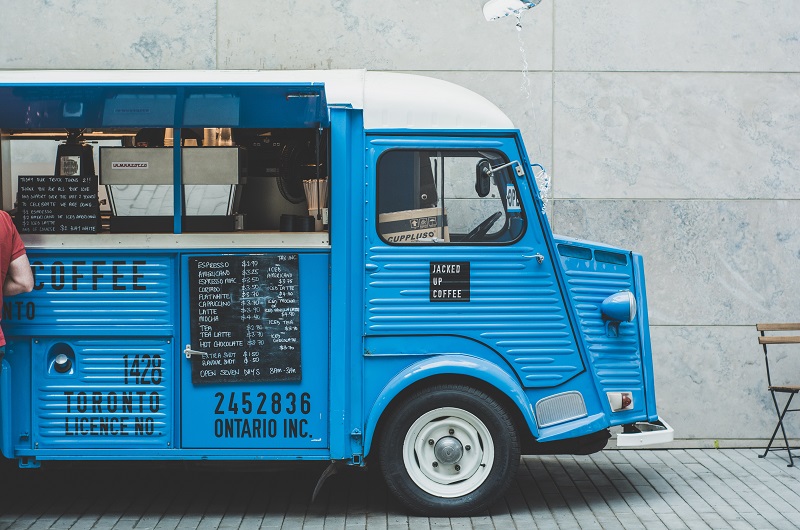
Is a Coffee Truck Business Profitable?
Yes! A coffee truck business can be profitable. It can generate ample income and provide you with the financial life you want. In addition to lower startup and operational costs, there are tremendous non-financial benefits to owning and operating your coffee business. Lifestyle and flexibility are just two common personal benefits.
But it will take work to get started.
As mentioned, a coffee truck or trailer has lower financial barriers than a traditional coffee shop, but it still requires money to be ready to serve your first coffee.
The danger with the “money factor” is that significant cost overruns may occur without appropriate planning and thoughtful budgeting. Everything from your storage, buildout, equipment, and operations can have significant overruns.
The best way to save money on your coffee truck startup business is by researching and planning your way through the process.
Coffee Truck Revenue Factors:
- Sales volume
- Average price point
- Appealing coffee menu
- Number of days in operation
- Hours of operation
- Additional income streams (Merch)
These include how many days of the week you sell coffee, your sales numbers, and your average receipt price. Additionally, many coffee truck owners may decide to work on the weekends or for particular events. Though profitable each day, this mobile business model will likely not be the same as a coffee truck owner active every day. Adding additional revenue streams, such as selling merchandise, can increase your coffee truck profits.
Mobile Coffee Business Annual Revenue Projections
| Type of Mobile Coffee Business | Potential Annual Revenue |
|---|---|
| Mobile Coffee Kiosk | $50,00 - $80,000 |
| Small Coffee Truck | $60,000 - $110,000 |
| Large Coffee Truck | $75,000 - $250,000 |
| Coffee Trailer | $50,000 - $145,000 |
For more information, please read our article, How Much Do Coffee Shop Owners Make?
![]()
Tips to Start a Coffee Truck Business
Start where you are. If you aren't sure of a concept, I recommend starting to visualize your concept, developing your menu offering, and figuring out where you would like to be located.
Additionally:
- Start researching your coffee truck or coffee trailer type.
- Consider what coffee trucks already exist in your neighborhood.
- Start coming up with a funding mix plan to launch your coffee business.
There are many great mobile coffee business options, any of which can be profitable.
Let's summarize how to start a coffee truck business in the list below:
- First, decide on a coffee truck concept.
- Consider who your customers are.
- Where would you like to be located?
- Develop your budget around your coffee truck concept.
- Consider which coffee trailer equipment you will need.
- Consider your power and water needs.
- Understand local health department regulations.
- Write your mobile coffee business plan.
- Get your mobile coffee truck (it must fit your concept, budget, and plan)
- Build out if needed
- Pass Inspection
- Get barista training.
- Develop your mobile marketing plan.
- Do a coffee truck opening practice run.
Starting a Coffee Truck Business
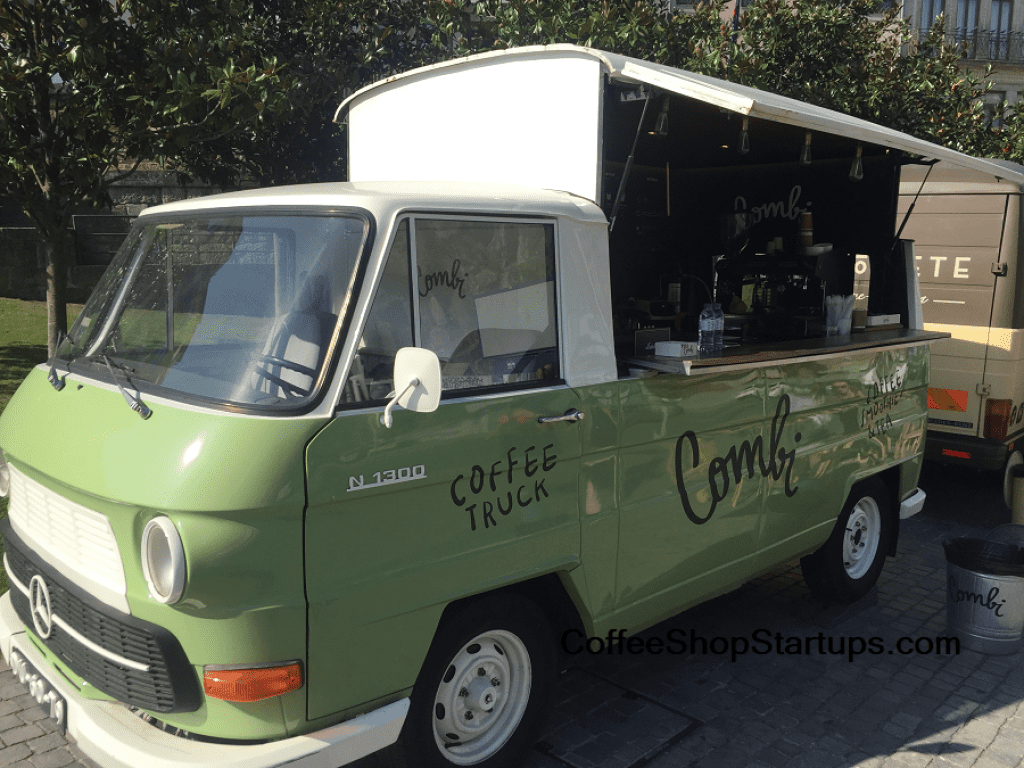
Your Coffee Truck Business Permits
Working with the Buildings Department and Health Department
Before your mobile coffee business can serve any coffee, you must get a permit through your local or county agencies.
Depending on your location, this process could be more cumbersome in some locations than others.
For starters, I recommend working with agencies in the locale you plan to do business in—not necessarily the city where you live (unless you are also planning to do business there).
If you plan on working in several cities or counties, you should decide where exactly you will be early on in the process of planning your coffee truck business. Once you determine where you operate your mobile coffee business, you'll need to determine all the requirements you'll need to satisfy before you are issued a permit.
For example, if you live in Riverside County in Southern California but plan on doing business in Los Angeles and Orange Counties, consider visiting with LA County and O.C. County agencies and reviewing their materials. Often, they will have this material available online. Read everything you can find online. Then, contact the agencies and get paper leaflets and instructions. Follow up and see how they are the same and differ from each other.
Each local agency has its objectives in determining your permit status, and they may vary slightly as they see fit. Ultimately, however, their goal is to keep you and your customers safe.
Before starting your mobile coffee business, your decisions will come into play before you work with the health department or buildings department.
Your mobile coffee menu may likely play a key role in:
- Which agencies do you work with
- How Agencies Determine Your Risk Level
- Additional requirements or equipment do you need to maintain a safe coffee truck
Working With The Buildings Department
Your building's department plays a vital role in your safety, employees', and customers' safety.
The rules vary from place to place, but ultimately, some agencies will have jurisdiction to determine the safety of your mobile coffee vehicle as it pertains to the structure of your mobile business.
It can be assumed that, in general, your local buildings' department is slightly more relaxed about street-legal vehicles than brick-and-mortar structures because trucks or trailers are not considered buildings.
While there is a certain latitude given to vehicles, this is generally not the case. Your buildings' department will assess and determine the safety of your coffee truck or trailer before giving you your permit.
The best thing to do is fully understand what requirements are necessary before you shop for your coffee truck or trailer and build it out. This requires you to look specifically at your county's requisites.
Ensure your electrical installation is “up to code”. Obtain commercial-grade materials and electrical wire for commercial use and possibly exterior/wet environments.
Additionally, your water systems and plumbing need to be up to code and built with specific materials. Finally, efficiently pumping water in and out of your coffee truck must comply with specific standards.
Consult with your building's department to ensure your coffee truck meets the necessary standards before applying for your health department permit. Even if you have a professional coffee truck manufacturer making the truck, check with your various departments to ensure your mobile coffee truck complies.
Working With Your Local Health Department
Your county health department might seem to overlap with the requirements of your buildings' department. In some circumstances, this is true.
While your buildings department is concerned about structural and electrical components, etc., your health department is squarely focused on preventing food-borne illnesses. Your health department wants to see your food prep, storage, serving, and waste disposal plan. As you start planning, determine if you need a commercial kitchen commissary to satisfy any health department requirements.
For example, the health department might determine that your specific coffee menu and operational plan require installing three or four sinks. However, the buildings department doesn't specify how many sinks you need to be sanitary and safe. Instead, the department's role is to ensure that your sinks are hooked up correctly, regardless of how many there are.
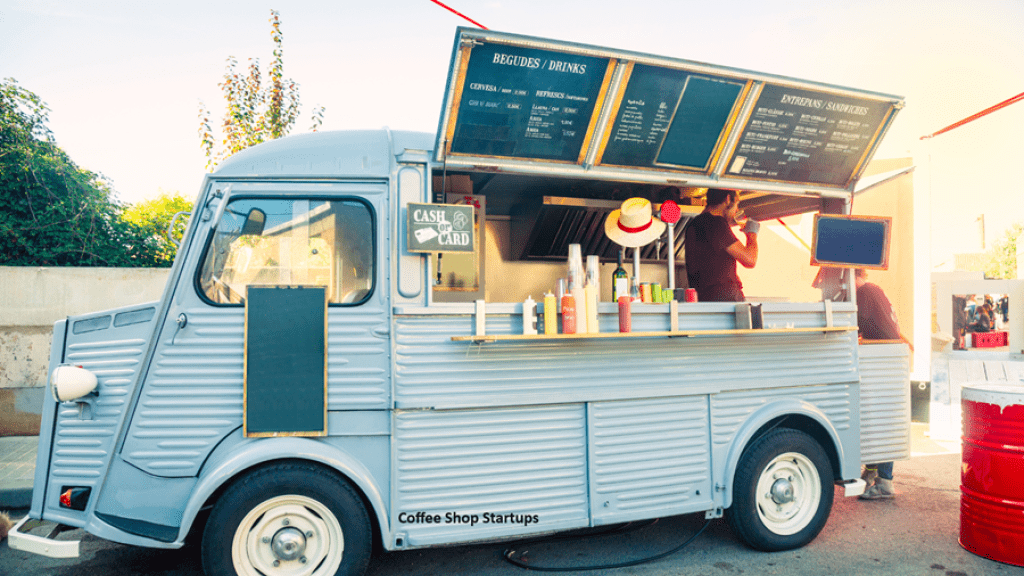
Additional Questions:
How do you set up coffee vending in public spaces?
Once you get your permits, you might need to go through a secondary vending process in public spaces. For example, if you have a mobile coffee business, there's a high probability that you will be selling coffee on city streets, accessways, and other public spaces.
The good news is that more and more communities are beginning to understand that sidewalk vendors, food trucks, coffee trailers, coffee stands, and coffee kiosks can be integral parts of their public spaces.
Being publicly accessible (and visible) on the street can potentially boost your profits as it affords you greater access to potential customers.
Of course, cities and regional agencies aim to achieve some regulations, standards, and best practices.
Many agencies play a big role in ensuring consumer and worker safety. These include your county's buildings department, health department, fire department, and others. You must obtain all necessary permits to operate as a business on your city sidewalks or squares.
These public vending regulations may not apply to vending on private property. Private events on private property may require different hoops to jump through. For example, if you want to set up at a special event like a festival or concert, you must be approved by the event organizer before the event.

Public Vending for Coffee Trucks
- Public vending permits are often required for selling on city streets, sidewalks, and other public spaces.
- Cities will enforce public safety regulations and standards, often involving health, fire, and building departments.
- Vending on private property or at private events will likely require separate approvals from event organizers or property owners.
Should I expect to work with the Department of Transportation?
Since many mobile food and beverage vendors operate in public “right of way,” your city's department of transportation may also require certain permits.
Often, a city requires all coffee vendors to get a business license and a “street use” permit before opening in a public right of way in any city.
Give yourself plenty of time to research every department's requirements.
It's common for city departments to be overwhelmed by application requests, so give yourself up to 8 weeks to process your submittal.
When it comes to your public-use permits, remember that they are “site-specific”—this means that if and when a permit is issued, it is only allowed for that specific site. Usually, a decal, sticker, or permit must be posted somewhere on the vending vehicle to avoid fines.
While every city or municipality may have regulations that need to be followed, you can be sure that they are there to protect people's health and safety in your area.
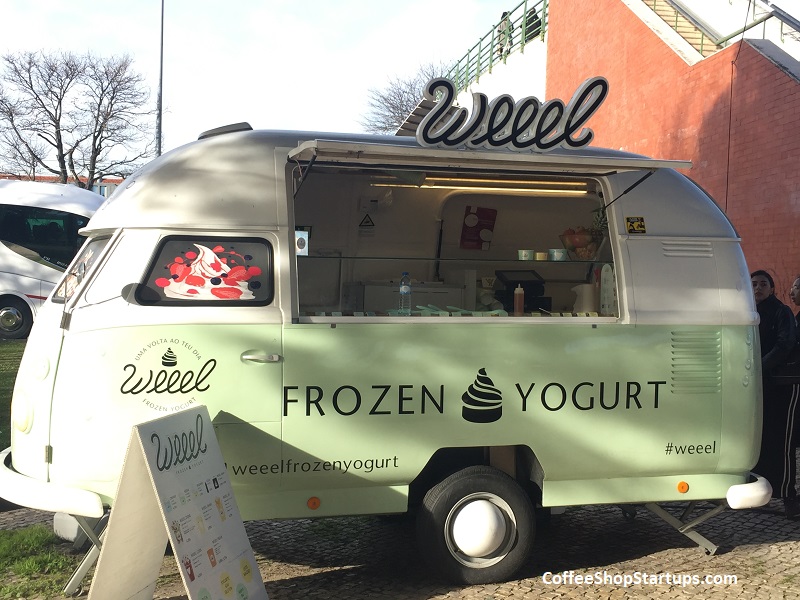
Zoning Requirements for Street Vending
Every area of your city has a zone for public use. These include residential zones, commercial zones, mixed zones, etc. Be sure your vending location is the property zoned for your coffee business.
The physical site you wish to work in will likely need to meet specific setback and clearance requirements. This provides adequate space for pedestrians, traffic, etc. The area around your coffee cart or kiosk should always be clear.
Best practices indicate that you should leave at least a five-foot-wide pedestrian corridor next to your mobile coffee truck. These areas should be free from cords or anything restricting pedestrian movement. Also, every city requires a vendor to have a certain setback distance from curbs, entrances, bus stops, parking lots, other vendors, etc.
When you apply for your permit, you may have to show all of these elements in the site plan that you submit together with your application. It's important to remember that your application might be denied if your business prevents access or safety at the park if you apply for a street use permit in a park.
![]()
Coffee Truck Permits and Licenses
“What's the application like for mobile coffee street vending?”
Applications may vary from city to city. However, generally, when you apply for a street use permit, you may need to prepare a package of documents.
These permit documents may include:
- Your application
- Detailed site plan (Note: tables and chairs may require a second and separate permit and review procedure)
- Description of use
- Health and Fire Department permit copies
- Business license copy
- Pay required fees
- Neighboring business access permit (if located next to other businesses)
Note: The list of names of documents might vary from one location to another. Make sure you get the relevant information from your local Department of Transportation!
“Will I work with my city to get my street vending permit?”
Depending on your city's backlog, a street use officer will often arrive to review the site if the actual location and your site plan meet all the requirements and setbacks.
Some jurisdictions vary, but you can assume that you will receive an official notice about whether your application was accepted or needs additional review shortly after your application submission.
For example, in cities like Seattle, the city's transportation department may send you a notice form. This form may indicate that you are expected to notify a list of adjacent businesses or households within a 100-foot radius of your vending location.
Your neighbors have the right to submit their comments to the Department of Transportation. After the officials review all submitted comments, the final decision will be made to approve, approve (with additional conditions), or deny your street use permit.
When you get the permit, don't forget to pay the administration fee, which will vary depending on your operation time (day or night). Failure to pay your fees might result in the termination of your street use permit.
Coffee Truck Revenue
“Are mobile coffee shops profitable?”
Yes, coffee trailers and coffee trucks are profitable.
In reality, some coffee trucks fail, while others continue to be very profitable. Typically, mobile coffee trucks enjoy lower overhead costs when compared to traditional brick-and-mortar. Usually, this is because you don't have the high rents that coffee shops are forced to pay.
Pound for pound, mobile coffee shops (trucks, trailers, and coffee vans) can bring in considerable amounts of money per day. Of course, this entirely depends on several essential factors. These include how many days you work, your sales, and your average price point.
Because these variables can completely swing across the spectrum, you can make anywhere from $300 a day to $1500 a day. Again, this depends on how many sales you have. And this does not include your operating costs. Here's another example taken from our post: Are Coffee Trucks Profitable?
Sample Revenue for a Coffee Truck:
| Sales Type | 80 Cups a Day | 120 Cups a Day | 200 Cups a Day |
| Coffee-Only ($4) | $320/day | $480/day | $800/day |
| Coffee & Snacks($6) | $480/day | $720/day | $1,200/day |
| Coffee & Breakfast ($8) | $640/day | $960/day | $1,600/day |
Info on the pricing:
- Coffee-only sales: Average receipt price is $4.
- Coffee & Snack Combo: The average combo price is $6.
- Coffee & Breakfast Combo: The average combo price is $8.
As you can see, if you add snacks and food, your margins will grow. However, your inventory costs and labor costs would also likely grow.
How Much Do Coffee Trucks Make?
If you're thinking about opening a coffee shop, it's important to know how to estimate how much money it might make. Business owners use a simple formula to predict future revenue based on customer spending and sales. Revenue is the total amount of money a coffee shop expects to bring in before paying for things like rent, supplies, and wages.
To figure out future revenue, we use this formula:
Revenue = (Average Transaction Value) × (Number of Transactions)
This means if you estimate how much each customer will spend and how many customers you’ll serve, you can get a good idea of how much your coffee shop could earn in a day, a month, or even a year.
By understanding this formula, future coffee shop owners can plan ahead – and develop their anticipated revenue within their business plan. For net revenue, the formula adds in your overhead costs:
Revenue =
[(Average Transaction Value) × (Number of Transactions)] – Overhead Costs
Remember, if you want to increase revenue, you’ll need to consider attracting more customers, encouraging people to buy more per visit, or adjusting pricing smartly. These numbers help set realistic goals and ensure a coffee shop has the potential to be successful. For more information, read Do Coffee Trucks Make Money?
“Are coffee trucks successful retail coffee options?”
Yes, coffee trucks can be a successful retail option for many coffee entrepreneurs. A coffee truck or trailer can sometimes provide a better opportunity to get a strong foothold in the local retail coffee industry.
In addition to potentially lower cost barriers, it can move to where the customers are. Due to space and capacity, your menu may be more limited if you were in a coffee shop, but not necessarily so. Your success may be impacted by your ability to find the best locations, rally your loyal customers, and keep operational costs in check.
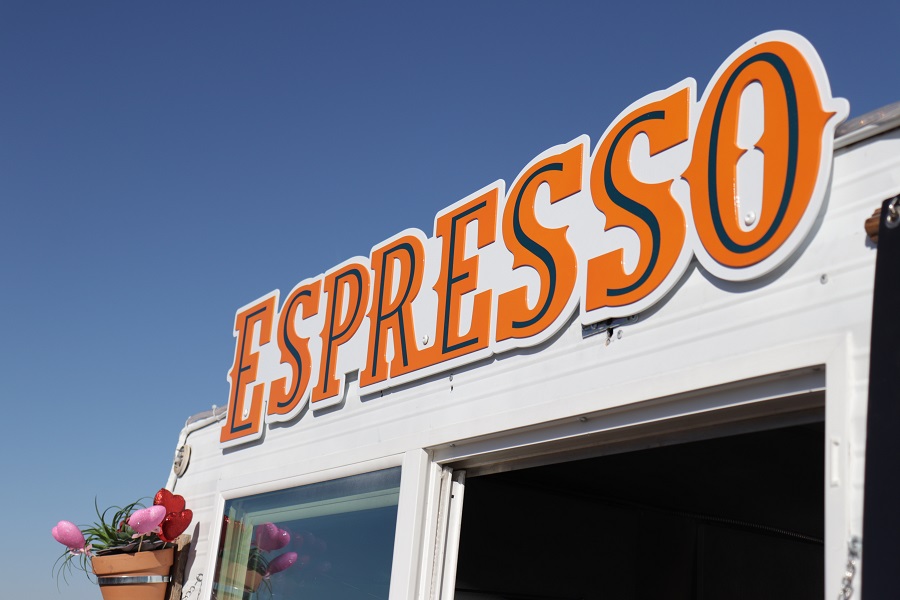
Starting a Coffee Truck Summary
There's no limit to a coffee truck business. It's an exciting low-cost coffee business option that makes sense regardless of location.
The opportunity to build a profitable and sustainable coffee business that you either work full-time or part-time is an excellent way to start your coffee business empire.
Let us help get your coffee business planning started.
Steps to Starting a Coffee Truck Business:
1. Decide on a Coffee Truck Concept
2. Fund Your Coffee Truck
3. Consider Who Your Customers Are
4. Develop Your Coffee Truck Budget
5. Get Your Coffee Truck
6. Consider Which Coffee Truck Equipment You Will Need
7. Consider Your Coffee Truck Power and Water Needs
8. Write Your Mobile Coffee Business Plan
9. Understand Local Health Department Regulations
10. Get Barista Training
11. Develop Your Coffee Truck Marketing Plan
12. Do a Coffee Truck Opening Practice Run
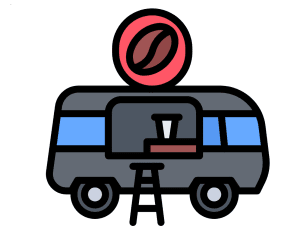
Get The Ultimate Guide!
Start a Coffee Truck Business
Affordable. Relevant. Comprehensive.

